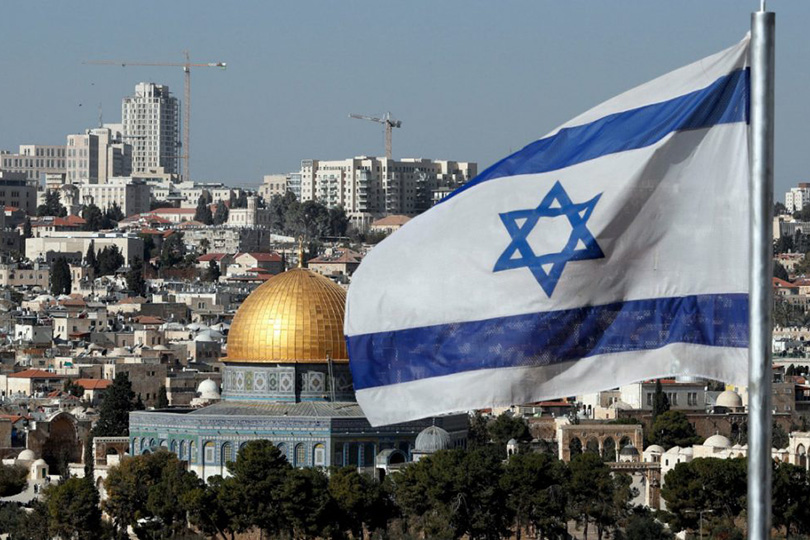Jack Moore
President Donald Trump informed his Palestinian counterpart Mahmoud Abbas Tuesday that he intends to move the U.S. embassy from Tel Aviv to Jerusalem, according to official Palestinian media, a decision that Arab leaders have warned could inflame the region.
Palestinian news agency Wafa, citing Abbas's spokesperson, reported that Trump informed Abbas of his "intentions" to move the embassy to Jerusalem, a move that essentially recognizes the city as the capital of Israel.
The report did not elaborate on when Trump would move the embassy, but unconfirmed reports have speculated that he will give a speech on Wednesday to announce the decision. The speech is currently slated to take place at the White House, at noon EST.
The statement said Abbas "warned of the dangerous consequences of such a decision on the peace process, security and stability in the region and the world." Palestinian officials said the call signalled the controversial move was likely to go ahead.
"When the U.S. President calls the Palestinian President to tell him that he has intentions to move the embassy, he is basically saying ‘get ready, I’m doing it,’" a Palestinian official, speaking on condition of anonymity as they were not authorized to comment on the matter, told Newsweek by phone. The official did not have direct knowledge of the specifics of the call.
The royal palace in Jordan said Trump also told Abdullah, King of Jordan, that he "plans" to move the U.S. embassy to Jerusalem.
"Jerusalem is the key to achieving peace and stability in the region and the world," the palace statement said.
An Arab Israeli official confirmed in a text message that the result of the meeting was "moving embassy...to Jersualem."
A U.S. official, who requested anonymity, said of speech on Wednesday: “The remarks are still being drafted, I don’t want to get ahead of anything, the particulars are still in the works.”
It remains unclear how far Trump will go in recognizing Jerusalem as Israel's "undivided capital," but it is assumed that he will make a statement regarding Israel's claim to the city. He could also delay the moving of the embassy for another six months.
Abbas, in response to the call, released a statement through his spokesman and called on Pope Francis and the leaders of Russia, France and Jordan to intervene on Trump's plan to move the embassy.
An official from the office of Israeli Prime Minister Benjamin Netanyahu declined to comment on Trump's intentions, amid reports that Israeli ministers were being warned by Netanyahu's office not to speak to the press before Trump makes his announcement.
An adviser to Abbas did not respond to a request for comment.
The Palestinians seek East Jerusalem as the capital of any future state. That area of Jerusalem, which Israel occupied in the 1967 Six-Day War, hosts the contested holy site known as the Haram al-Sharif, or Noble Sanctuary, to Muslims, and the Temple Mount to Jews.
The Obama administration and its predecessors maintained that the status of Jerusalem must be decided through direct negotiations between both sides, and not through unilateral moves.
But Trump made it a campaign pledge to move the embassy to Jerusalem, a decision that has pleased the Israeli right, who lauded his election as a boost for their nationalist agenda.
The embassy move has left some in the U.S. government, particularly in the State Department, anxious about the repercussions for the U.S. representations across the Muslim world, with embassies and consulates facing a heightened security threat because of angry protests.
"There are folks who have concerns with what a potential announcement regarding the embassy could mean for the region as far as policy, a settlement down the road, and the potential for protest and violence as the result of any announcement," the U.S. official said.
At the heart of the move is Trump's pick for the U.S. ambassadorship to Israel is his ambassdor to Tel Aviv - and former bankruptcy lawyer David - Friedman. Friedman, a novice on the diplomatic arena but a long-time pro-Israel advocate, has maintained strong ties to Israel and to the settlement project over the years and is a vocal supporter of the move.
Vocal opposition in the Arab world grew louder on Tuesday in the build-up to Trump's speech.
Palestinian, Saudi, Jordanian and Turkish leaders and officials have all rallied in opposition to the potential move. Turkish President Recep Tayyip Erdogan threatened on Tuesday to cut off all ties with Israel in response to the move.
“Mr. Trump, Jerusalem is the red line of Muslims,” he told a parliamentary meeting of his ruling AK Party. “This can go as far as severing Turkey's ties with Israel. I am warning the United States not to take such a step, which will deepen the problems in the region.”
The Iraqi Prime Minister Haider al-Abadi said in a statement that moving the embassy would affect stability in the Middle East, and received the news "with the utmost worry."
Russian President Vladimir Putin called Abbas to express Moscow's support for renewed talks between the Israelis and Palestinians on the ancient city's status, the Kremlin confirmed on Tuesday.







Comments